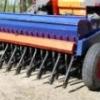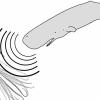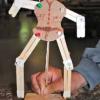Search Results
Showing results 1 to 8 of 8

Oil Spill Cleanup
This hands-on experiment will provide learners with an understanding of the issues that surround environmental cleanup.

Pollution Patrol
Source Institutions
In this activity, learners explore how engineers design devices that can detect the presence of pollutants in the air.

Planting with Precision
Source Institutions
In this activity, learners explore how engineers work to solve the challenges of a society, such as efficient planting and harvesting.

Make Pooter
Source Institutions
In this activity, learners will explore engineering to construct an insect collecting tool (insect aspirator). The pooter uses suction to safely collect smaller insects that nets miss or may injure.

Echolocation in Action!
In this activity, learners simulate whale echolocation. Learners experience echolocation by wearing blindfolds, while another learner makes snapping noises in front of, behind, or to the side of them.

Paper making: a craft and a chemical engineering major
Source Institutions
In this activity, learners explore the question "What is paper?" Learners discover the processes and materials required to make paper while experimenting with different recycled fibers and tools.

Lever Cowboy
Source Institutions
In this activity, learners build a figure that moves and "comes to life" when they pull its string.

Flower Engineers
Source Institutions
This activity (on pages 24-29) combines science and art to introduce learners to how different animal pollinators spread pollen from one plant to another, and how certain shapes, colors, and smells of
